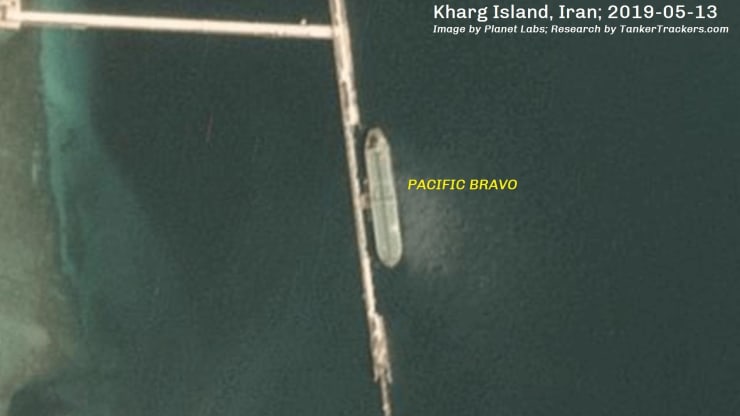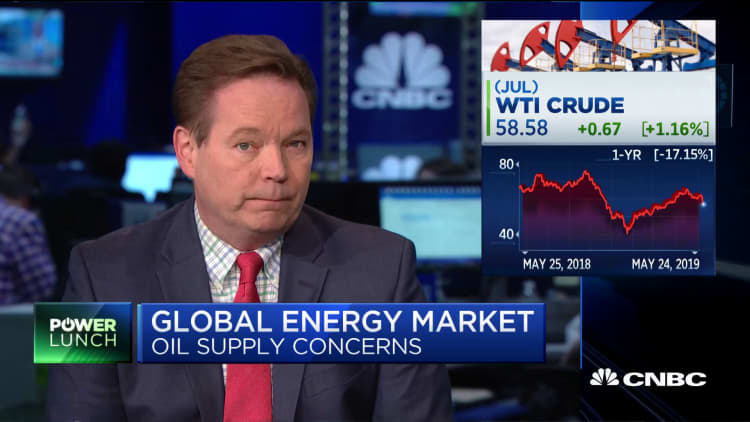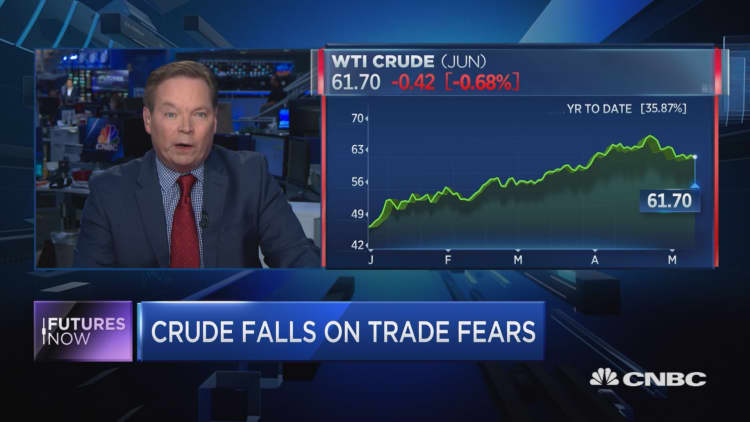A single oil tanker could become a factor in both the China trade war and Iran tensions
PUBLISHED THU, MAY 30 2019 11:03 AM EDTUPDATED THU, MAY 30 2019 5:58 PM EDT
Leila Gharagozlou source : CNBC.com
- The oil industry is watching the progress of a Chinese tanker that is loaded with Iranian crude, potentially in violation of U.S. sanctions.
- Two websites that tracks oil vessels, documented the first departure of a supertanker carrying crude oil out of Iran since the Trump administration ended oil waivers earlier this month.
- The U.S. State Department warns the U.S. government will enforce its sanctions on Iranian oil.

Chinese-owned tanker Pacific Bravo loading up crude oil at Kharg Island in Iran
Courtesy of Planet Labs and TankerTrackers.com
As trade tensions rise between the U.S. and China, the oil market is watching the progress of a Chinese ship loaded with Iranian crude to see whether it heads home with its cargo — in possible violation of U.S. sanctions.
The supertanker, Pacific Bravo, was documented by tanker-tracking firms TankerTrackers.com and KPLR carrying crude out of Iran, possibly to China for what is believed to be the first shipment since the Trump administration ended oil waivers on May 1.
“Are the Chinese actually going to flout the sanctions or not? This would be the first outright flouting of the sanctions, and if they’re committed to them it’s important to Iran and a big outlet for them, for the regime to stay afloat,” said John Kilduff, partner at Again Capital.
The State Department would not comment on whether the Pacific Bravo has violated sanctions, but it did say it would enforce sanctions by cracking down on ships or facilities that defy them.
WATCH NOW
“Treasury continues to target ships and companies facilitating illicit trade with Iran, and has made it clear to the maritime shipping community that we will vigorously enforce our sanctions,” a spokesman said.
U.S. government officials have warned China and specifically Hong Kong, to avoid violating sanctions against Iran, according to news reports. The warning came after the Chinese-owned oil tanker was spotted picking up a shipment of oil from Iran in early May.
The Trump administration has vowed to get Iran’s oil exports to zero as part of its maximum pressure campaign, ending oil exemptions for countries like China, India, Syria and Turkey on May 1.
The Pacific Bravo was recently purchased by the Bank of Kunlun, a holding of the state-owned China National Petroleum Corp. It is a bank known to work closely in facilitating trade between China and Iran.
Tracking the ship
After loading Iranian oil, Pacific Bravo was spotted in the Persian Gulf around May 11 by the two tanker tracking firms. Once there, the tanker is believed to have shut off its automatic identification system transponder and made its way to Iran’s Kharg Island where it made its first loading of crude, according to TankerTrackers.com
Pacific Bravo was subsequently seen at the Soroosh offshore oilfield, according to the tracking website. Samir Madani, co-founder of TankerTrackers.com, said that once the vessel had loaded up, it turned its automatic identification system back on and broadcast that it was headed to Indonesia.
Scrutiny of Pacific Bravo comes at a time when tensions between the United States and China are elevated. The escalating trade war and national security concerns between Washington and Beijing have put China’s past relationship with Iran under increased pressure.
China had publicly taken a step back from Iran and promised to comply with U.S. sanctions. However, if Pacific Bravo were to deliver Iranian crude to China that would violate U.S. sanctions, possibly complicating ongoing trade talks.
The global oil industry has kept an eye on Iran and its trading partners like China and India, monitoring any possible shipments out of the country. Iran had seen no orders put through for the month of May and had seen its oil exports slow since the Trump administrations sanctions went into place in November. The U.S. Treasury Department however, has made it clear that any violation of sanctions would not be tolerated.
‘Outside the scope of the UN’
Hong Kong, a hub for global finance and a city more vulnerable to U.S. sanctions than other Chinese cities, has echoed China’s stance against U.S. sanctions on Iran. In response to a warning from U.S. government officials, the Hong Kong Commerce and Economic Development office, told CNBC that the city follows sanctions decided by the United Nations Security Council.
“Restrictions imposed by the UN Security Council on Iran have been fully implemented in the HKSAR under the United Nations Sanctions [Joint Comprehensive Plan of Action – Iran] Regulation [Chapter 537BV of the Laws of Hong Kong]. However, the UN Security Council has not imposed any restrictions on the export of petroleum from Iran. Certain countries may impose unilateral sanctions against certain places on the basis of their own considerations. Those sanctions are outside the scope of the UN Security Council sanctions implemented by the HKSAR.”
WATCH NOW
The U.S. had been a party to the Joint Comprehensive Plan of Action but President Donald Trump withdrew from agreement, which is still in place. At the time, the U.S. said it was concerned the agreement was one-sided and that it should be renegotatiated.
Pacific Bravo is not the only vessel on the radar for potential Iranian oil shipments to China. On May 16, Reuters reported that after a five-month trek beginning in January, a vessel called the Marshall Z unloaded nearly 130,000 tons of Iranian oil to the Chinese City of Zhoushan, violating U.S. sanctions.
Currently sailing away from Sri Lanka
Madani said his team expects that the Pacific Bravo could eventually head toward the Strait of Malacca, where it might switch hands to the Chinese, through a ship-to-ship transfer, a common practice for Kunlun-owned vessels. It could take months before the oil is actually delivered to China. Madani also points out that despite U.S. warnings to Hong Kong, the city is an unlikely final destination for the tanker, due to a lack of oil refineries. Currently, the tanker is sailing away from Sri Lanka.
Alex Booth, head of market analysis at KPLR, said a change in the destination is likely.
“It is quite common for vessels to change their destinations. Indonesia could be a checkpoint on the journey rather than the end destination,” Booth said.
Although Booth said it is quite likely that the vessel will end up in China rather than Indonesia, he stresses that ultimately there is no way to be certain until the delivery has been completed.
This is not the first time China’s Bank of Kunlun has faced warnings from U.S. officials. In the past, the bank had been used as China’s conduit for trade with Iran. After having continued its trade with Iran during the last sanctions regime, the Obama administration moved to impose sanctions on the Chinese bank.
In April 2019, however, the bank informed its customers of a change in policy, stating that it would no longer clear Iranian transactions once the U.S. oil waivers ended on May 1 this year.
The latest delivery could signal a shift in the bank’s — and China’s — policy toward Iran.
The Chinese government has been vocal about its opposition toward Trump’s Iran policy and in the past has gone against U.S. sanctions to help Iran.
Iran’s foreign minister, Mohammad Javad Zarif, paid a visit to Beijing earlier this month to discuss China, Iran relations in the wake of the U.S. maximum pressure campaign. He called on China and the EU to take, “concrete action” to preserve the nuclear deal.
But during the ongoing trade negotiations with the U.S., the Chinese took a much harder stance against Iran.
Prior to Trump’s renewed sanctions on Iran, China was one of Tehran’s largest trading partners, and its biggest crude customer — buying nearly 585,400 barrels per day.
The Chinese embassy did not immediately return a request for comment on the Chinese-owned vessel.
— With reporting by CNBC’s Patti Domm.


Aucun commentaire:
Enregistrer un commentaire